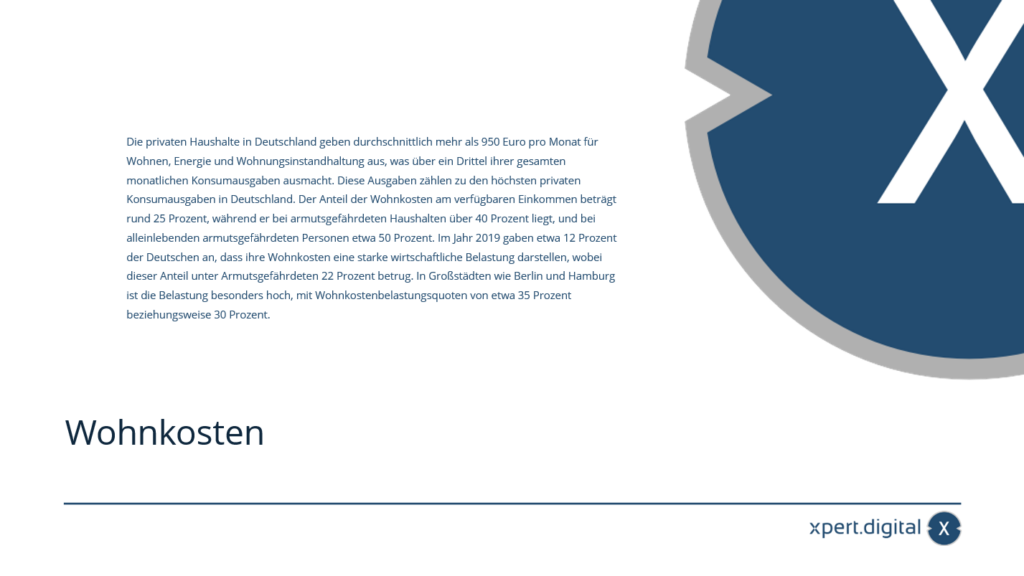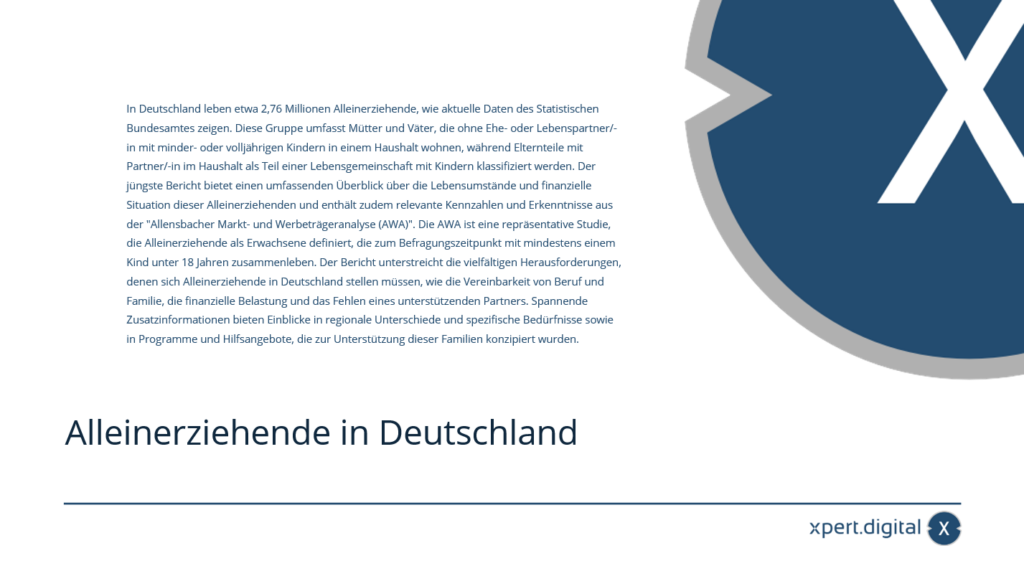Housing costs, additional housing costs, rising costs and no end - the future of living in the cost spiral - with PDF download
Published on: July 30, 2024 / Update from: July 30, 2024 - Author: Konrad Wolfenstein

Housing costs, additional housing costs, rising costs and no end - the future of living in the price spiral - Image: Xpert.Digital
🏡 The rising additional housing costs: A challenge for many households
📝🏠 Additional housing costs are increasingly putting a strain on many households in Germany, and it is essential to find out more about the various elements that influence these costs. The Taxpayers' Association has put a useful tool online, the so-called property tax checker . This allows citizens to find out in which municipality the property tax has already been increased. However, additional housing costs do not only consist of property tax, but also of a variety of other factors that make housing increasingly expensive and increasingly unavoidable. Below we examine the different cost drivers and provide a comprehensive overview of the current situation.
🏠✨ Current expenses for housing, energy and maintenance
Private households in Germany currently spend an average of more than 950 euros per month on housing, energy and home maintenance. This means that housing costs account for more than a third of the total monthly consumption expenditure of private households. Expenditure on housing is therefore among the highest private consumer spending in Germany.
📊💶 Share of housing costs in disposable income
If you look at the disposable income of private households, the share of housing costs is currently around 25 percent. In households at risk of poverty, the proportion of income that has to be spent on housing is even more than 40 percent. According to the EU definition for the European Union Statistics on Income and Living Conditions (EU-SILC), a person is considered to be at risk of poverty if they have less than 60 percent of the median income of the total population. If the person at risk of poverty lives alone, the proportion of housing costs to available household income is even higher at around 50 percent.
"According to the definition of the Statistical Office of the European Union (Eurostat), people are considered to be overburdened by housing costs if more than 40 percent of their household's disposable net income (less housing subsidies) is spent on housing costs."
In 2019, around 12 percent of people living in Germany said they felt heavily economically burdened by their monthly housing costs. This applied to around 22 percent of the population at risk of poverty. In large cities such as Berlin or Hamburg, the housing cost burden is particularly high. The housing cost burden ratio, i.e. the ratio between housing costs (rent including additional costs) and household net income (sum of all net income, ie after taxes and social security contributions), is around 35 percent in the federal capital. In Hamburg, the housing cost burden is around 30 percent.
🔌 Energy costs as a significant factor
If you examine the factors that contribute to the increase in additional living costs, the energy costs stand out above all. Electricity, heating and hot water make up a significant part of the additional living costs. Energy prices have increased steadily in recent years. Another important factor are municipal taxes and fees. These include, among other things, the disposal of garbage, wastewater fees and the costs of street cleaning and winter service. The amount of these fees varies greatly depending on the municipality and can represent a significant financial burden for some households.
🔧 Maintenance and servicing
One area that is often overlooked is the expense of maintaining and maintaining the home. These costs have also increased noticeably in recent years due to increased material and craftsman costs. For residential property owners, this means they need to regularly budget for repairs and renovations to maintain the value of their property and meet modern energy efficiency standards.
🏛️ Property tax and local politics
In addition, the constant increase in property taxes in many municipalities also has a direct influence on the amount of additional housing costs. This tax is levied by the municipality and is based on the standard value of the property and the assessment rate set by the respective city or municipality. In recent years, many municipalities have significantly increased their assessment rates, often due to budget deficits, which leads to an immediate increase in additional housing costs.
🏙️ Rental price development in cities

Single parents are often at risk of poverty, and housing costs play a significant role - Image: Xpert.Digital
The development of rental prices in German cities and metropolitan areas also contributes significantly to the housing cost burden. Demand for living space in cities such as Munich, Frankfurt and Stuttgart remains high, and the supply of affordable housing is scarce. This excess demand leads to rising rents, which represent an immense burden, particularly for low-income households.
📊 Utility bills and transparency
Another important aspect is the landlord's utility bills, which are often complex and non-transparent. Many tenants have difficulty checking these statements and understanding their accuracy. This often leads to disputes between tenants and landlords and increases uncertainty on the part of tenants.
💰 Out-of-pocket costs
A particular focus should also be on the so-called “out-of-pocket” costs, i.e. the direct payments that households have to spend on services and maintenance work that are not covered by rent or additional costs. These expenses are often underestimated, but can quickly become significant, especially with older properties and technical systems.
📈 Demographic changes
In addition, demographic changes and influx into cities are making the situation on the housing market more difficult. An increasing number of single-person households, an aging population and the continuous influx of workers into urban centers are increasing the pressure on the already tight housing market.
🔧 Solutions and measures
Given all of these challenges, however, there are also solutions and measures that can help reduce additional housing costs. Energy-saving measures and renovations that reduce the energy consumption of buildings can reduce energy costs in the long term. Government funding programs for the construction and renovation of apartments that are particularly aimed at energy efficiency can also help to reduce the cost burden.
📋 Transparency in utility bills
In addition, increased transparency and simplification of utility billing is necessary. Legal requirements and standards could better protect tenants and help them understand the actual costs. The support of tenant associations and advisory institutions can also help tenants know and be able to enforce their rights.
🏗️ Municipal housing policy
Another point is local housing policy. Through the commitment of municipal housing associations and the promotion of social housing, the supply of affordable housing can be increased. This can provide relief, particularly in cities and metropolitan areas that are in high demand.
🛠️🏡 Affordable housing in Germany
Overall, it is clear that additional housing costs are a complex and pressing issue that affects many households in Germany. However, through informed decisions, political measures and targeted support for those affected, ways can be found to reduce the burden and make the dream of affordable housing possible in the future.
🏠💰 Single parents are most at risk of poverty due to housing costs
Single parents are often at risk of poverty, and housing costs play a significant role. It is often more difficult for single parents to find affordable housing because they usually only have one income while also having full responsibility for their children. High rents, especially in urban areas, can eat up a large portion of income, leaving less money for other necessary expenses such as food, education and health care.
💸 Financial burdens
In addition, single parents often do not have the same financial resources and networks as couple households, who can benefit from two incomes and secure themselves financially. These pressures increase the risk of poverty and financial instability.
📊 Studies and reports
Studies and reports on this topic confirm that single parents are at an above-average risk of or affected by poverty. Measures to support single parents, particularly with regard to affordable housing and child care, are therefore of great importance in order to reduce the risk of poverty in this population group.
🏡📊 Important numbers at a glance
- 🌟 Monthly expenses of private households in Germany for housing, energy and housing maintenance: €1,025
- 🔑 Monthly expenses of private households in Germany for apartment rent: €779
- 📈 Share of housing costs of private households in Germany in total monthly consumer spending: 36%
- 🧑👧 Share of housing costs in the disposable income of single parents in Germany: 32.2%
- 💔 Share of housing costs in the disposable income of single parents at risk of poverty in Germany: 47.9%
Housing costs – image/PDF: Xpert.Digital
📣 Similar topics
- 🌐 The rising additional housing costs: causes and effects
- 💸 Property Tax Checker: A useful tool for households
- ⚡ Energy costs as the main driver of additional residential costs
- 🏘️ Rental price development in German cities: challenges and solutions
- 🧾 Utility bills: transparency and accuracy
- 🔧 Maintenance costs: An often overlooked factor
- 🏙️ Housing costs in big cities: Berlin and Hamburg in focus
- 👩👧👦 Households at risk of poverty and their housing costs
- 🌱 Energy-saving measures to reduce additional living costs
- 🏘️ Municipal housing policy: solutions and measures
#️⃣ Hashtags: #Ancillary housing costs #Energy costs #Rent prices #Households at risk of poverty #Housing construction policy
🎯🎯🎯 Benefit from Xpert.Digital's extensive, fivefold expertise in a comprehensive service package | R&D, XR, PR & SEM

AI & XR 3D Rendering Machine: Fivefold expertise from Xpert.Digital in a comprehensive service package, R&D XR, PR & SEM - Image: Xpert.Digital
Xpert.Digital has in-depth knowledge of various industries. This allows us to develop tailor-made strategies that are tailored precisely to the requirements and challenges of your specific market segment. By continually analyzing market trends and following industry developments, we can act with foresight and offer innovative solutions. Through the combination of experience and knowledge, we generate added value and give our customers a decisive competitive advantage.
More about it here:
🏡🌟 What is the difference between housing costs and additional housing costs?
🏡 Housing costs and additional housing costs are terms that refer to different aspects of housing expenses. Here are the main differences:
🏠 Housing costs
definition
This includes the basic costs directly associated with housing.
elements
Housing costs typically include rent (if renting) or mortgage payments (if owning), as well as property taxes if you own a home.
Example
Rent payments to the landlord or monthly installments for the apartment or house loan.
💡 Additional living costs
definition
This includes additional costs that arise in addition to the housing costs and are necessary for the operation and maintenance of the living space.
elements
Additional residential costs include expenses for heating, water, electricity, garbage collection, chimney sweeps, caretakers, building cleaning, insurance (e.g. residential building insurance), and often also the costs for communal facilities (e.g. hallway cleaning, garden maintenance in rental apartments).
Example
Heating bills, water bills, electricity costs, waste disposal costs and janitorial services.
🔍 In summary
living costs
are the direct costs incurred for using the living space itself (rent or mortgage).
Additional living costs
are additional expenses that are necessary for the operation and maintenance of the living space, but do not directly affect the use of the living space itself.
Both types of costs together result in the total monthly housing expenses incurred for living.
We are there for you - advice - planning - implementation - project management
☑️ Industry expert, here with his own Xpert.Digital Industry Hub with over 2,500 specialist articles
I would be happy to serve as your personal advisor.
You can contact me by filling out the contact form below or simply call me on +49 89 89 674 804 (Munich) .
I'm looking forward to our joint project.
Xpert.Digital - Konrad Wolfenstein
Xpert.Digital is a hub for industry with a focus on digitalization, mechanical engineering, logistics/intralogistics and photovoltaics.
With our 360° business development solution, we support well-known companies from new business to after sales.
Market intelligence, smarketing, marketing automation, content development, PR, mail campaigns, personalized social media and lead nurturing are part of our digital tools.
You can find out more at: www.xpert.digital - www.xpert.solar - www.xpert.plus



























